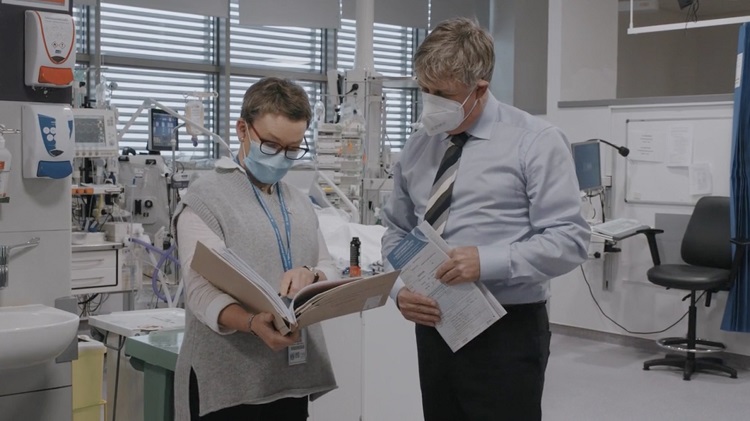Global study finds gene variants that could help improve outcomes in severe COVID-19 patients
Posted 9 March, 2022

A global study of 57,000 people on the genetics of severe COVID-19 – in which University College Dublin led the Irish cohort – has identified several genetic factors that put some at higher risk for severe illness and death due to the virus.
(opens in a new window)Reported in Nature, the Genetics of Mortality in Critical Care Consortium ((opens in a new window)GenOMICC), which includes St Vincent’s University Hospital (SVUH), found 16 genetic variants in people with severe COVID-19 that affected blood clotting, the immune system, and inflammation response.
The international team found key differences in some genes in ICU patients when compared with the DNA of the other groups – a link that could allow for those patients who will best respond to existing treatments for severe COVID-19 to be identified, as well as help in developing new treatment options.
The findings included how a single gene variant that disrupts a key messenger molecule in immune system signalling – called interferon alpha-10 – was enough to increase a patient’s risk of severe disease.
This gene’s key role in the immune system suggests that treating patients with interferon – proteins released by immune cells to defend against viruses – may help manage the virus in the early stages.
The study also found that variations in genes that control the levels of a central component of blood clotting – known as Factor 8 – were associated with critical illness in COVID-19.
This may explain some of the clotting abnormalities seen in severe cases of COVID-1, as Factor 8 is the gene underlying the most common type of haemophilia.
“This study allows us to identify targets for novel or repurposed therapeutics to improve outcomes in the critically ill COVID patient,” said co-author on the study, (opens in a new window)Professor Alistair Nichol, Chair of Critical Care Medicine at UCD School of Medicine, SVUH consultant, and Director of the Irish Critical Care-Clinical Trials Network.
“Trials like REMAP-CAP have already demonstrated that agents aimed at these targets, inflammation and anticoagulation, can improve outcomes. This study gives us trialists a much greater range of targets for the future.
“COVID will be with us for a long time and we need to continue to increase our range of therapeutics,” he added.
Professor Nichol led the Irish branch of the study – with the (opens in a new window)overall global study being led by the University of Edinburgh in partnership with Genomics England.
“Our latest findings point to specific molecular targets in critical COVID-19. These results explain why some people develop life-threatening COVID-19, while others get no symptoms at all,” said Chief investigator and a Consultant in Critical Care Medicine at University of Edinburgh, Professor Kenneth Baillie.
“But more importantly, this gives us a deep understanding of the process of disease and is a big step forward in finding more effective treatments.
“It is now true to say that we understand the mechanisms of COVID better than the other syndromes we treat in intensive care in normal times – sepsis, flu, and other forms of critical illness. COVID-19 is showing us the way to tackle those problems in the future.”
(opens in a new window)The world’s largest study of the genetics of severe COVID-19, GenOMICC researchers sequenced the genomes of 7,491 patients from 224 intensive care units in the UK and Ireland.
Their DNA was compared with 48,400 other people who had not had COVID-19, participants in Genomics England's 100,000 Genomes Project and that of a further 1,630 people who had experienced mild COVID.
“As COVID-19 evolves, we need to focus on reducing the number of people getting seriously ill and being hospitalised. Through our whole genome sequencing research, we’ve discovered novel gene variants that predispose people to severe illness – which now offer a route to new tests and treatments, to help protect the public… from this virus,” said Co-author and former Chief Scientist at Genomics England, from Queen Mary University of London, Professor Sir Mark Caulfield.
By: David Kearns, Digital Journalist / Media Officer, UCD University Relations (with materials from Caroline Byrne, UCD Research and Innovation)
Latest
- Taoiseach announces State Funding for student accommodation with proportion held at discounted rents for students most in need
- Speaker Emerita Nancy Pelosi receives honorary degree for lasting legacy to public service
- Video series to build AI policy capabilities among leaders launched by UCD Centre for Digital Policy
UCD academics on The Conversation
- Opinion: The leap year is February 29, not December 32 due to a Roman calendar quirk – and fastidious medieval monks
- Opinion: Nigeria’s ban on alcohol sold in small sachets will help tackle underage drinking
- Opinion: Nostalgia in politics - Pan-European study sheds light on how (and why) parties appeal to the past in their election campaigns






